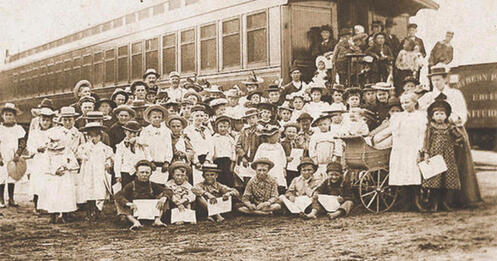 Hikers find refuge on the trails at West Sixth Farm outside Frankfort, Ky. Photo by Rick Showalter. Hikers find refuge on the trails at West Sixth Farm outside Frankfort, Ky. Photo by Rick Showalter. Immediately after my last posting, I wanted to write about the climate disasters we have been facing this summer. I intently followed the path of hurricane Sally, as you might imagine, curious and fearful about the sort of destruction my namesake might wreak. Meanwhile, once again safe from flooding and wind damage here in central Kentucky, we rather guiltily endured our own fallout from the historical wildfires raging out west: a few gray days as lingering smoke obscured the sun. In California, Oregon, and Washington, the damage to lives, livelihoods, homes, businesses, the economy, the environment, our national forests—to normalcy—is nearly incomprehensible to those of us who don’t live there. Around the nation, our continued denial of what is causing these natural phenomena—the unabated warming of our planet that is breaking up Antarctica’s glaciers and raising sea levels and altering rain patterns and resulting in five tropical storms scuttling around the Atlantic simultaneously—reeks of insanity. Yet, we persist in our inaction. But before I was able to wrangle my thoughts and my fury and my shame on that topic, Justice Ruth Bader Ginsburg died. I was paralyzed, like so many others. We all knew she had battled heroically against numerous cancers, and we were aware she had been in and out of the hospital this year. We all held our collective breath. But suddenly our optimism that she would always be victorious, always vanquish the silent oppressor, had been punctured, and we deflated like tired balloons. Today, to be hopeful seems ridiculous. And just as I was trying to come to grips with the certainty of her death and its repercussions, Kentucky Attorney General Daniel Cameron strode to the pulpit and delivered an unctuous sermon about why Breonna Taylor matters. Evidently she matters because her innocent neighbors had to endure bullets flying through their home when a no-knock warrant was served at Taylor’s adjacent apartment. Bullets fired by an out-of-control police officer. Law and order, you know. The bullets that landed in Breonna’s apartment, however, in Breonna, were righteous. Legal. All by the book. All to protect the neighbors’ safety. Like so many others, I find I can’t focus. I can’t do the research I need to write accurately about the things that matter to me. I’m over-stimulated. I’m angry. I’m scared to pay attention. I have to pay attention. I don’t know where to look. Meanwhile the pandemic rages. Football teams and their fans gather along the playing fields. Children remain at home, wondering when they will return to the classrooms many of them loathed in the “good times.” Even my elderly dog is craving different people, different running grounds, different smells. She is so sick of us. And of our palpable worry. I have nothing positive to offer. The days are shortening. Cooler weather is upon us. Solitary walks in the woods might help (while we still have them). Or hiding under a blanket with a hot toddy or a sip of bourbon. Meanwhile, I’m fretfully lying in wait for the next cataclysmic crack in our national psyche. We know it’s coming. It’s 2020 after all.
5 Comments
 A scene from an orphan train. Photo provided to CBS News by the National Orphan Train Complex Museum and Research Center. A scene from an orphan train. Photo provided to CBS News by the National Orphan Train Complex Museum and Research Center. Once I had decided to write a novel about my grandfather, I knew that I wanted to hew to the facts of his life as closely as possible. That, of course, required extensive research—research into the public records that revealed his movements and actions, research into the other people who inhabited his world, research into the cities where he made his home, and research into the history and culture of the United States between 1900 and 1942. For me, one of the most difficult aspects of writing Next Train Out was knowing when it was time to stop researching and start writing. In the end, external circumstances pushed me to abandon my feeble efforts to educate myself and find the courage to put words on a page. I had enrolled in the Author Academy at the Carnegie Center for Literacy and Learning in Lexington, Ky., and my mentor wanted to see a fledgling manuscript. Although there was still research I wanted to pursue, I stopped making that my emphasis and turned my attention to creating a fictional world. Occasionally, of course, I still had to stop writing and look up some historic detail or spend a little time pursuing a lead that had just turned up. Sometimes the leads that most intrigued me were unfortunately set aside as new distractions demanded my attention. Earlier this summer I finally picked up the phone to pursue one of those leads. I had some notes that indicated that, in 2000, Effie Mae’s great-granddaughter had lived one county north of my home. I didn’t know if that was still the case, or whether the contact information I had for her was still valid. But since I finally had some time, I was determined to see if I could find her. Eventually, one of the phone numbers I tried rang through. “Hi. My name is Sallie Showalter. Is this Storme Vanover?” I asked tentatively. “Yes.” “Ms. Vanover, I live nearby in Scott County, and I recently wrote a novel about the woman I believe was your great-grandmother—Effie Mae Frady.” “Yes, that’s right. Effie Mae was my grandmother Edna’s mother.” “Well, my grandfather was married to your great-grandmother and, if you’re interested, I’d love to meet you and give you a copy of the book.” With that prompt, Storme, who was driving her car at the time, began to share some of her family’s story. Last week I met with her for an hour in her home in northwestern Grant County, and she graciously filled in more of the details. Storme is indeed the granddaughter of Effie Mae’s younger daughter Edna (whom I call Eileen in the book). I knew from my research (or rather, from Chuck’s research) that Edna had eventually moved to Michigan and married there. Storme was born in Detroit. What I did not know was what happened after Effie Mae left her three older children in Kentucky, including Edna, when she and her youngest son Doug moved to Cincinnati. The 1920 census confirms that Effie and all her children were living with Effie’s brother in the Logmont coal camp. But I had to imagine what happened to the three older children Effie Mae left behind. In my naiveté—which reflects the ease of my own life—I decided that the children stuck together and successfully navigated their way to adulthood. As I look back on it now, I created a rosy moving picture story, complete with a softening scrim that subdued the hardships they must have endured. In reality, as Storme shared with me, Edna, at some point after her seventh birthday, was put on an orphan train and landed in a Catholic orphanage. No one knows where that orphanage was, but I was distressed to read the stories of neglect and abuse at a number of those institutions in Kentucky and elsewhere. According to Storme, Edna eventually initiated steps to take her vows as a nun. But her plans were derailed when she became pregnant by a young priest-in-training—or was it a truck driver? Edna's story would vary. Wherever the truth lay, it seems that Edna’s older sister Vivian (I call her Valarie in the book) cared for baby Shirley for some time, perhaps contrary to Edna's wishes. Edna eventually moved to Michigan, and Edna and Shirley were reunited when Shirley was six. The father of the child had no further role in their lives, and Edna and Vivian never spoke again. This is just a glimpse into a family story full of tragedy and mésalliances as well as love and loyalty. That story is Storme’s story, and I will leave it to her to tell. But I’ve thought about what I’ve learned from her about the fate of Effie Mae’s children. If I had reached out to Storme while I was writing the book, would I have portrayed Effie’s story any differently? Did Effie Mae know what happened to Edna? To Vivian and Lynn, her older son? Did Effie herself put Edna on that train? Or was that Edna’s father, whom Edna was devoted to? Or was it her uncle, who had taken the whole family in? I didn’t pursue a lead while I was writing my grandfather’s story, and I now know more of the truth underlying his tale. That truth doesn’t change the work of fiction I created. But it does deepen my understanding of the lives interwoven with his own, and it reveals the hidden complexities of all our stories. |
Details
Archives
June 2023
Categories
All
|


 RSS Feed
RSS Feed